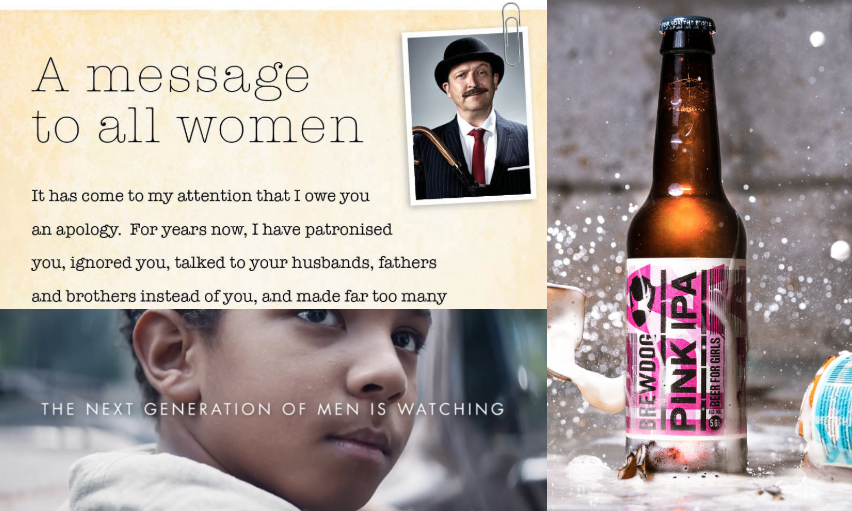1st Aug 2019

1st Aug 2019

If we actually look at the guidelines, they consider the following to be unacceptable and cause for a ban:
An ad that depicts a man with his feet up and family members creating mess around a home, while a woman is solely responsible for cleaning up the mess.
Ads that directly contrast male and female stereotypical roles or characteristics - a man being adventurous juxtaposed with a woman being delicate or dainty is likely to be unacceptable.
An ad that depicts a man or a woman failing to achieve a task specifically because of their gender, e.g. a man's inability to change nappies; a woman's inability to park a car.
An ad that depicts a woman prioritising the application of make-up over being on time for a work meeting and is late for the meeting as a result. Care should be taken not to suggest in an ad that women should prioritise their appearance over their professional ambition or other aspects of their life.
An ad in which a man is belittled for displaying emotional vulnerability.
An ad that depicts a person who was unhappy with multiple aspects of their life, then implies that all their problems were solved by changing their body shape to conform to gender-stereotypical norms. This does not prevent responsible ads for weight loss products or services.
Where an ad features a person with a physique that does not match an ideal stereotypically associated with their gender, the ad should not imply that their physique is a significant reason for them not being successful.
It's a lot to take in, but sounds fair enough.
However, under those same guidelines, the following principles are acceptable:
Glamorous, attractive, successful, aspirational or healthy people or lifestyles.
One gender only, including in ads for products developed for and aimed at one gender.
Gender stereotypes as a means to challenge their negative effects.
So there are still loopholes for advertising companies.
And like with any socially political issue nowadays, there are those who are completely against the new guidelines, and believe them to be, quite frankly, nonsense. Cries of 'PC gone mad' and SJWs (Social Justice Warriors FYI) being at it again, ring around social media, with the staunch argument that people don't actually pay that much attention to adverts. They don't dictate how each member of the public should behave, based on the gender roles they present. Many find it kind of insulting that these guidelines need to be put in place in the first place - George Harrison, writer for controversial magazine Spiked, felt that "it is mad to suggest that sexism in Britain is down to the televised portrayal of women doing the hoovering or men doing DIY."
But is it though? If someone is constantly bombarded with similar messaging from multiple outlets, aren't they going to subconsciously take in that messaging? Isn't that the point of advertising?
Typically, it looks like sexist adverts in particular, are always at a woman's expense. Google 'sexist ads' and 99% of them are aimed towards women. There are multiple blog posts and news articles dedicated to it. And you can't blame them - there is an extensive list of examples to choose from. Even from within the past decade.
Example no.1 - the Year 8 boys' favourite and the choice Christmas gift from your Nan, Lynx. Those adverts of women crawling on their hands and knees to men because of their Africa body spray won't be around anymore. Ultimately, Lynx knew their audience were teenage boys, and so geared all of their advertising towards their sexist banter and fantasies - crowds of supermodels vying for the affection of your average man.
However, they are starting to change - Lynx's 'Is it ok for guys…' campaign challenged society's perception of what it means to be a man, highlighting pressures whilst still relating to their audience in a more meaningful way, moving away from portrayals of half-naked women.

The new law comes in a time of social media and everyone having the opportunity to voice their opinion - it's a very hard job to create something that pleases every single person.
Even those with the best intentions sometimes face the wrath of the displeased on Twitter. NatWest's 'Mr Banker' ad campaign was created in an attempt to make banking easier for women and apologises for their sexist language in the past. Instead, it was labelled 'patronising,' 'tone-deaf,' and 'mansplaining' banking. Some apology.
Like NatWest, the new wave of 'feminist' advertising (Exhibit A: BrewDog), can come under fire. In an attempt to recognise the gender pay gap, BrewDog created a beer that was to be sold at a fifth of the price of their usual Punk IPA, and only sold to women. Also, in an attempt to highlight the 'lazy' efforts made by ad agencies when aiming a product towards women, it was packaged in a pink label and renamed Pink IPA. I think personally, it was a pretty clever idea, but the execution wasn't the best. It was probably a little too subtle and needed too much explaining, as the majority of people had a similar attitude towards this as they did NatWest - many called it a 'cynical marketing stunt.' It also resulted in a man suing BrewDog as he was refused the beer, for obvious reasons. Ouch.
In a similar stance, Gillette's 'The best men can be' advert demonstrates how attempting to prevent sexism at its apparent main source can land you in hot water. Some angry (male) viewers took to social media, how everyone does when they've got a gripe to bear, stating that they will never buy Gillette products again due to the way it seemed to blame men for all the sexist troubles in the world and the general 'feminist propaganda' presented in the advert. The pantomime villain himself, Piers Morgan, cast his opinion over the matter, calling for a worldwide boycott against the company.
It highlights the classic predicament that many advertising companies face - you can't please everyone. It's a little more painful when that everyone is effectively your entire audience, but hey, at least their advert didn't feature women in their underwear and overtly masculine men.
It was revealed this month that Gillette have reported an $8 billion writedown in sales last quarter, as a result of this ad. Maybe the threats of chucking out razors rang true. 'Get woke, go broke' seems to be the popular phrase to apply to Gillette's unfortunate situation. Gary Coombe, President and CEO of the company, is not sour about it however, and doesn't regret his decision to go ahead with the ad. To him, the worst thing about the whole affair is that they "lost connection" with the millennial market.

But what about men?
This isn't a one-sided issue - men are subjected to stereotypes just as much as women, whether that be über-macho or completely inept. Like female stereotypes, men are often represented in the home. However, unlike women, men are seen to be lazy and don't have that much involvement in family life, drinking in the corner while mum does everything. The 2012 Asda Christmas advert exemplifies this - the mum is running around, making sure everything is perfect for Christmas, while the dad is either pretty passive about the whole thing or completely absent in places. Even the tagline dismisses the man's role at Christmas. There are plenty of men out there that bloody love Christmas and want to get involved with every opportunity. It's slightly unfair to only single out the mother's role in the whole build-up and celebration of the season. Men aren't lazy and who's to say they aren't good dads? So why present them in this light?
Again, Huggies' 'Dad Test' presented a similar sort of portrayal. I'm pretty sure most dads can change a nappy, which is why many found the Huggies advert baffling - the men presented seemed to lack the basic parental skills, and were pretty indifferent about the whole thing. Many were infuriated with the name of the campaign, claiming that parenthood isn't a trivial matter that can be awarded via a test - dads are capable of being left alone with their child, with no harm done due to ineptness. It all led to one American dad launching an online campaign against the advert, with the strapline, "we're dads, Huggies. Not dummies."

Change is brewing, however. A Nottingham-based air conditioning company landed in some hot water July this year, with their advert and its eloquently-put "Your wife is hot!" tagline. Having originally been blocked from being plastered all over buses, the advert found its way onto a billboard, much to the dismay of passers-by. Whether it was meant to be harmless fun, as the designer of the ad called it, it caused a big enough stir to be investigated and potentially taken down if it's deemed to have breached the new guidelines.
While this particular advert is still being investigated (at the time of writing), it's been revealed that two mainstream TV ads have been banned, thanks to the new guidelines. Philadelphia and Volkswagen featured 'harmful gender stereotypes' - funnily enough, both relate to caregiving. Whilst Philadelphia showed incompetent dads neglecting their kids in favour of soft cheese, Volkswagen presented men engaging in daring and risk-taking activities, and cut to a woman sitting next to her pram. After they had been banned, the ASA were sympathetic towards the two brands though, stating that neither company sought to overtly go along with the stereotypes, and that they recognised it was 'light-hearted' fun. Sounds familiar.
It highlights how companies that do not go out of their way and deliberately portray these sexist stereotypes, will still fall flat on their faces, thanks to the new guidelines and the almighty force of social media.
Ultimately, it goes to show that yes, there are adverts that are being investigated and/or banned thanks to the ASA code, but adverts many deem to be sexist are still being passed through and approved by company boards or agencies, and are allowed to be printed/produced in the first place.
Sexist advertising is not a straightforward matter. The guidelines laid out by the ASA aren't a quick fix that's going to solve the issue. Some might argue that the new rules won't help at all - the subjectiveness of them means that what might be perfectly fine to one individual, might be abhorrently sexist to another. The Philadelphia advert exemplified this. Mondelez, owner of Philadelphia, were 'extremely disappointed,' arguing that they presented a 'positive image' of fatherhood, with two men looking after their babies, going against the stereotype of having two mothers. They've got a point, but the execution didn't quite land.
It's a difficult subject to tackle and to make matters worse, it is one that is incessantly evolving as society develops. It's a minefield. And I wish anyone creating adverts featuring the sexes, good luck.